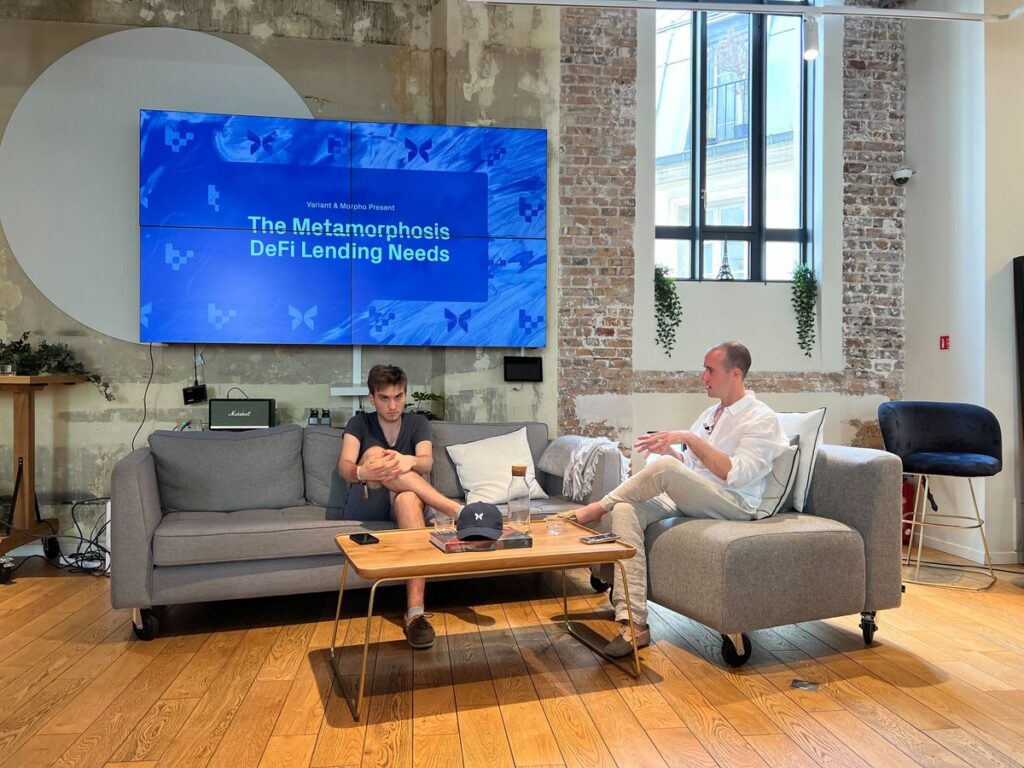Geoff Hamilton
Building a Truly Scalable Lending Protocol: Morpho at EthCC
Morpho co-founder Paul Frambot lays out a radical path for scaling DeFi lending and teases the next generation of Morpho.
I recently hosted a fireside chat with Morpho Labs co-founder Paul Frambot at EthCC in Paris, during which Paul confirmed that Morpho is working on a new lending primitive—one of the most notable (and slept-on) announcements to come out of this year’s EthCC.
But what insights are motivating and shaping the evolution of Morpho? Our conversation covers Paul’s framework for the two types of DeFi projects, the limitations of existing lending platforms, and his views on how to build a truly scalable lending protocol.
This conversation is a must-listen for anyone interested in how to build truly scalable projects and the future of DeFi. Paul is an accomplished builder, and his insights about what DeFi can do to realize its potential are timely and provocative.
To quote Paul: “This is the endgame. The goal is not to provide leverage services to a handful of traders, the goal is to bring those protocols to mass adoption and really improve the current state of finance for everyone.”
I highly recommend the entire discussion, but below are some highlights for those who only have time for the tl;dr:
- Paul’s key framework for classifying DeFi projects: decentralized brokers and protocols (5:20)
- The limitations of decentralized brokers in DeFi lending (7:47)
- How to overcome the limitations of the decentralized-broker design and realize the full potential of DeFi lending (10:35)
- How protocol builders can manage the complexity they push to users (13:12) and attract others to build useful products on top of their protocol (15:00)
- Why the protocol model will be dominant in the long run (18:02)
Here are two of my biggest takeaways:
There are two types of DeFi platforms: decentralized brokers and protocols
In an excellent blog post on June 30, Paul introduced the idea that DeFi platforms can be divided into two groups: decentralized brokers and protocols. Decentralized brokers facilitate onchain financial interactions but require active management by governance to perform their functions. Protocols, on the other hand, are trustless and unopinionated financial primitives. Our talk explores the difference between the two types of platforms, and Paul explains their strengths and weaknesses.
Proposition: DeFi lending needs protocols
Paul makes a strong case for why decentralized brokers are not the future of DeFi lending: they are not trustless, efficient, or able to reach scale. He explains why protocols are a better structure for lending markets at scale and lays out an approach to building and scaling a lending protocol.
+++
Variant is an investor in Morpho. This post is for general information purposes only. It does not constitute investment advice or a recommendation or solicitation to buy or sell any investment and should not be used in the evaluation of the merits of making any investment decision. It should not be relied upon for accounting, legal or tax advice or investment recommendations. You should consult your own advisers as to legal, business, tax, and other related matters concerning any investment. Certain information contained in here has been obtained from third-party sources, including from portfolio companies of funds managed by Variant. While taken from sources believed to be reliable, Variant has not independently verified such information. Variant makes no representations about the enduring accuracy of the information or its appropriateness for a given situation. This post reflects the current opinions of the authors and is not made on behalf of Variant or its Clients and does not necessarily reflect the opinions of Variant, its General Partners, its affiliates, advisors or individuals associated with Variant. The opinions reflected herein are subject to change without being updated.

